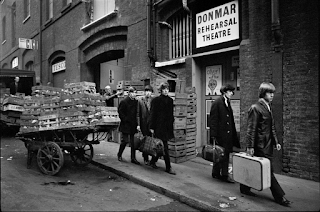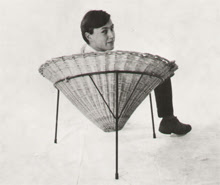Monday, 12 December 2011
Encounters: loss
Wednesday, 16 November 2011
Swingers
 Envy, I suspect, lies behind my irritation at those 60s icons – David Bailey, Michael Caine, Terence Stamp, Twiggy, any Beatle or Stone you care to name – who are forever saying how exciting it was, how young they were, how they didn't have a clue what they were doing, they just made it up as they went along – how, at any moment, it could disappear in a puff of marijuana smoke. It all sounds so much fun.
Envy, I suspect, lies behind my irritation at those 60s icons – David Bailey, Michael Caine, Terence Stamp, Twiggy, any Beatle or Stone you care to name – who are forever saying how exciting it was, how young they were, how they didn't have a clue what they were doing, they just made it up as they went along – how, at any moment, it could disappear in a puff of marijuana smoke. It all sounds so much fun. 
Friday, 14 October 2011
Grumpy old man

Tuesday, 20 September 2011
"Mummy, they're going in again!"
This is Simon Murie. He's standing on a grassy hummock on the shore of Buttermere in the Lake District, doing I forget what with a banana. A joke involving cold water and male shrinkage? Demonstrating front crawl with soft fruit?



Brief Encounters: parallel parking
More interesting is news that happiness is contagious. Research from the US suggests three degrees of separation of positivity: our good mood affects not just us, but our friends, their friends and even their friends.
I was reminded of this a few days ago. I was trying to parallel park in front of a cafe filled with onlookers, and after ten minutes of getting no closer to the kerb gave up in a huff, leaving the car a foot from the pavement.
A man leapt up. "You're not gonna leave it like that are you, love?" he said. I nodded. "Give me the keys." As I handed them over (while simultaneously undoing decades of feminist progress) it occurred to me he might just drive off, but of course he didn't. It was a random act of kindness that forced me to trust him, and made me smile for the next two hours. I wonder if my own meagre acts, in a causal, butterfly-flapping-its-wings way, somehow prompted it. I like to think they did.
Tuesday, 16 August 2011
Steppe On


Saturday, 23 July 2011
Big Hack
Barely a day passes these days without Nick Davies’s picture byline on the front of The Guardian. He is the investigative journalist behind the story of the moment: phone hacking, Murdoch and the News of the World.
Davies is journalist as rock star – handsome, charming, and confident bordering on arrogant. He has been called "courageous", "heroic" and "the British Bernstein and Woodward to Murdoch's Nixon" (he was apparently inspired into his line of work by the Watergate scandal, filmed as All The President's Men with Dustin Hoffman and Robert Redford). Oh, and "pompous", according to Private Eye editor, Ian Hislop.

The masterclass was off the record. But it's not too controversial to say Davies talked about his early days as a reporter in South Devon, recently graduated from Oxford. A seasoned photographer accompanied him on his first “doorstepping” – visiting a young widow to talk to her about her husband’s death at work in suspicious circumstances.
“What are you going to say?” asked the old-time hack. “I’ll tell her I’m investigating her husband’s death,” replied Davies, brimming with confidence. “She’ll shut the door in your face," the old hack said. "Tell her you're writing an appreciation of her husband, and she'll invite you in for tea." It was Davies's first lesson in the art of investigation.
How does he decide what stories to investigate? Anything that makes you think, hang on, something doesn't add up here, he told us.
Phone tapping at NoW is just the first in a long line of impressive scoops. He uncovered the story on nurse Beverly Allitt, has investigated education, drug policy and penal reform. And he spotted the potential in Wikileaks before anyone else. Unsurprisingly, he has a book deal from the Murdoch story, it was reported yesterday.
Guardian editor, Alan Rusbridger, says Davies never gives up. "Although he's in his mid to late 50s now, he's still got an amazing appetite for standing on doorsteps, for getting out and meeting people, and spending long evenings in seedy bars or whatever it takes to get the story," he told Radio 4 last week.
"He is a troublemaker, and quite often when he comes into the office, your heart sinks because you know there's going to be trouble. That happened when he came in and said, 'I've just met Julian Assange and he's got the biggest cache of secrets the world has ever seen.' Part of you thinks, that's fantastic, and part of you thinks, oh God, how are we going to deal with that one?"
Daily Telegraph political journalist Peter Oborne has said: "He's uncomfortable to be with, there's no ease when you're with him, you make a joke and he tends not to get it. But I have no doubt that he's the greatest living British journalist."
In a way, Davies is why almost anyone becomes a journalist: he uncovers the truth, and his stories change things. Right now, the press, police and politicians are changing how they do business with each other. I can't say many of my stories have achieved that.
Thursday, 16 June 2011
Rainforestman

Thursday, 26 May 2011
The wisdom of Michelle O
 Dressed in a white tunic, black pants and a major gold belt – together with her black eye-liner, looking just a little bit 60s – Michelle Obama offered some career and relationship wisdom to a group of schoolgirls from inner city London (just up the road from here) who were visiting Oxford University. Who wouldn't want this wonderful woman on speed dial for all of life's crises?
Dressed in a white tunic, black pants and a major gold belt – together with her black eye-liner, looking just a little bit 60s – Michelle Obama offered some career and relationship wisdom to a group of schoolgirls from inner city London (just up the road from here) who were visiting Oxford University. Who wouldn't want this wonderful woman on speed dial for all of life's crises? Thursday, 12 May 2011
Himalayan porters



Wednesday, 11 May 2011
Monks


Sonam Sherpa

Lhakpa Sonam Sherpa lives in Namche Bazaar, a small, horseshoe-shaped town perched on a mountain high up in Nepal's Khumbu Valley, where the air is thin. Crows caw-caw loudly, yaks stroll through the streets, and the chink-chink-chink of hammer on stone is a constant soundtrack.




Monday, 7 February 2011
"Million dollar Mickey Mouse music"
A year or so after I left university, I briefly joined a short-lived film music orchestra. John Barry, along with the other John (Williams), was our God. I sat in front of the brass section and opposite the violins, both of whom had all the fun.
But despite the dull cello parts, I’ve never had so much fun playing in an orchestra. I had shivers in every rehearsal, such was the emotional intensity of the music.
Barry, who died last week, was the master of ear-splitting, striptease brass and soaring violins. He used both copiously in his 11 James Bond soundtracks. He was also a paid-up member of the impossibly glamorous 60s set, marrying Jane Birkin in 1965 (pictured above, tooling around in his E-Type Jaguar). “I was besotted,” she said in 2008.
His razzle-dazzle 007 theme tunes mirrored perfectly the films’ outlandish plots and characters, most notably Goldfinger and Diamonds Are Forever. But many featured lush, elegant melodies, such as From Russia With Love, Moonraker and the gorgeous, cascading You Only Live Twice. Barry was a great experimenter, too: his sinister soundtrack for The Ipcress File featured a cimbalom, with its haunting, metallic jangle.

In spite of his success – including five Oscars – he called his work “million dollar Mickey Mouse music”.
Barry had his faults. He dodged the tax man and was banned from the UK for a spell. And he had a penchant for girls considerably younger than himself (Birkin was 19 to his 32 when they married), illustrated in this story told by his friend, Glenys Roberts.
“John ... liked his women young,” writes Roberts. “I was on the same transatlantic flight as one of his girlfriends when she altered her date of birth on her passport with a bottle of duty-free vodka (which dissolves ink) and a fountain pen. You could do that before the days of barcodes and biometric passports. She thought that, given his track record, she would be more suitable for him if she was ten years younger.” Ah, the 60s.
Thursday, 20 January 2011
Brief Encounters: surf crowd
There´s Billy from California, who´s been partying too much: "I haven´t seen him carrying a surfboard much lately," someone said, concernedly. There´s Bob, who rigged up a contraption back home in land-locked Idaho to help him get his paddling arms into shape. It involved bottles of water and a pully. And there´s Jennifer, my roommate, a smart New Yorker studying for a PhD who surfs at home - in Queens.
But best of all, there´s Dusty. A silver-haired grandfather in his 60s, he surfed for 20 years in southern California in the 1950s and 60s on longboards, when you learned by clambering first to your knees, then your feet. He chuckles at the memory.
Married for 33 years and living hundreds of miles from the sea, he takes a surf trip three or four times a year, usually to Baja. What´s the attraction? "It clears you head. I´ve got a lot of demons in here," he smiles. His four grandchildren are impressed. "They think it´s pretty cool their Grandpa surfs."
He didn´t surf this morning. He walked to the sea with his board, and came back shaking his head. "Terrible. Messy as anything. It´ll clean up later."
Monday, 17 January 2011
Brief Encounters: Francisco
He lives in Mal Pais, a "legendary" surf town on Costa Rica´s Pacific coast. He goes to school here. His parents are American, but he says he is Costa Rican, and he´s fluent in English and Spanish. He is talkative but seems a bit lonely.
The ocean is dotted with surfers from sunrise onwards, bobbing in the water and riding the messy waves. His mother works at a surf camp. He is surrounded by dudes day and night - they muss his hair, play around with him and throw him into the pool.
"Your surfing must be pretty good," I say. "I don´t surf," he replies matter-of-factly. Now, living in Mal Pais and not surfing is like living in the Alps and never skiing. I ask him why, but in reply, he shrugs and dives to the bottom of the pool. But I already know: it is Francisco´s nine-year-old way of asserting his independence, of wanting to be different from every other person in this town. I inwardly salute his confidence, and kick off for the other side of the pool.





